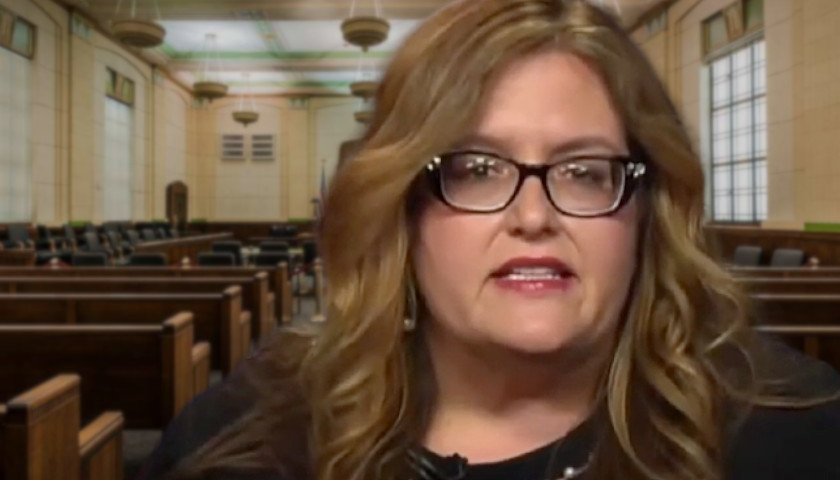A new book by The Federalist editor and Fox News contributor Mollie Hemingway details how 2020 Pennsylvania-election litigation by former President Donald Trump lost its focus on equal protection and got dismissed.
In Rigged: How the Media, Big Tech, and the Democrats Seized Our Elections, Hemingway credits Philadelphia attorney Linda Kerns with attempting to keep Trump’s lawsuit challenging Pennsylvania’s election results focused on Fourteenth Amendment concerns. The author significantly blames Rudy Giuliani for causing the case to unravel by making superfluous arguments.
Rigged is an investigative work that examines the various efforts made by Joe Biden-aligned bureaucrats, lawmakers, journalists, attorneys and tech mavens to effect a Democratic Party win in the 2020 election. The book discusses at length the vulnerability of no-excuse mail-in voting to fraud—a concern that prominent members of both parties expressed not long before the COVID pandemic was used to justify vastly expanding absentee voting last year. Hemingway also goes into depth on various other matters such as Democrats’ recruitment of progressive nonprofits funded by Facebook Chief Executive Officer Mark Zuckerberg to help administer elections.
And she devotes much space to Trump’s court challenges to the official vote counts in Pennsylvania, Georgia, Michigan, Wisconsin, Arizona and Nevada. Her conclusion? A failure to pursue the case effectively in Pennsylvania presaged Trump’s lack of success in other state courts—but not for want of merit.
Trump’s lawyers’ filing on November 9, 2020, spelled out the campaign’s case. In short, the attorneys said then Pennsylvania Secretary of State Kathy Boockvar (D) and the Democrat-run election boards of six counties failed to give voters their constitutionally guaranteed equal protection of the law by ensuring that their votes wouldn’t be diluted by fraud.
The problem was, according to the argument set forth by Kerns and her Pittsburgh-based colleagues Ron Hicks and Carolyn McGee: a) several counties counted mail-in ballots without heeding certain statutes, including a requirement that those ballots be postmarked on or before Election Day; b) while local election officials were handling ballots in certain precincts, Trump’s poll watchers were prevented from observing; and c) some county election boards sent unsolicited mail-in ballots to voters, resulting in voters getting two ballots.
Hemingway noted that Trump’s attorneys reliance on the Fourteenth Amendment’s equal-protection clause had a precedent in the 2000 court case that resolved that year’s presidential-election dispute.
“It was the same argument that had merit in Bush v. Gore, the federal case that determined who would be the forty-third president of the United States,” Hemingway wrote.
But that argument wouldn’t get much of a hearing in November 2020.
Soon after the attorneys filed their statement in the U.S. District Court for the Middle District of Pennsylvania, an organization of Democrats and a few prominent ex-Republicans called the Lincoln Project tweeted that Trump’s opponents should make his lawyers “famous.” The tweet included Hicks and McGee’s contact information.
After the attorneys received death threats and other vulgar emails calling them “traitor,” “Nazi” and various expletives, the Porter Wright law firm which employed Hicks and McGee withdrew from the case. John Scott and Douglas Bryan Hughes of Texas would come aboard to work alongside Kerns in insisting that Pennsylvania’s 2020 election proceedings had denied equal protection to voters.
Before they could make their first oral arguments, Trump lawyer Rudy Giuliani held a press conference wherein he made what Hemingway deemed sensationalized allegations regarding the extent of voter fraud. The former New York mayor brought forward Daryl Brooks, a convicted sex offender who affiliated with the Democrats in the past, to make assertions about restrictions that Democrats supposedly placed upon him as a Republican poll watcher.
The lawyers working on the Pennsylvania lawsuit didn’t care for Giuliani’s approach and didn’t plan on adopting it when arguing their case before Judge Matthew Brann. Kerns was unhappy to hear from Giuliani that he was coming to take over the Pennsylvania litigation. She wanted to deny Giuliani sponsorship to argue as an out-of-state attorney in Pennsylvania, but the ex-mayor found another lawyer to sponsor him.
Once Giuliani was in, the earlier focus on equal protection was out. As Hemingway tells it, Giuliani would go on for hours “about fraud that he could not substantiate with evidence.”
At that point, Kerns wanted out too and eventually persuaded Brann to allow her to withdraw. The judge would end up dismissing the case and Biden’s 1.2-percent margin of victory in Pennsylvania would stand.
In Hemingway’s assessment, this was a misfortune that would lead to others.
“By wasting time on less relevant claims, an important lawsuit failed,” she wrote. “It had catastrophic effects for the remaining legal battles. Pennsylvania could have been the first domino to fall for the Trump campaign in a sequence of tightly contested courtroom victories. Instead, it was the beginning of the end for the campaign’s effort to hold Democrats accountable for foul play. It also had a ripple effect throughout the legal community. The media were soon dismissing all legal challenges as baseless attempts to prove widespread fraud, ignoring more substantive claims.”
– – –
Bradley Vasoli is a reporter at The Tennessee Star and The Star News Network. Follow Brad on Twitter at @BVasoli. Email tips to [email protected].
Photo “Linda Kerns” by Broad and Liberty.





